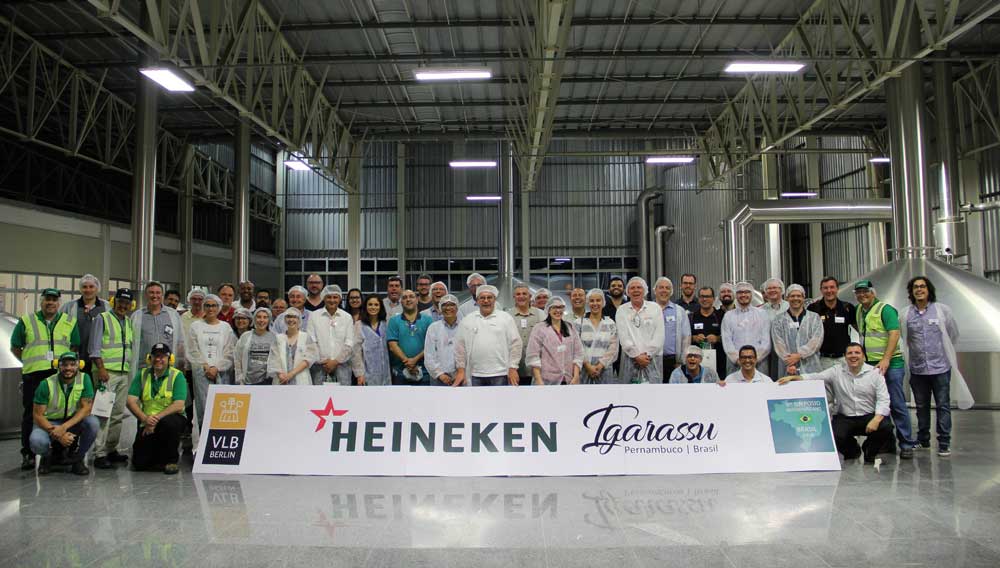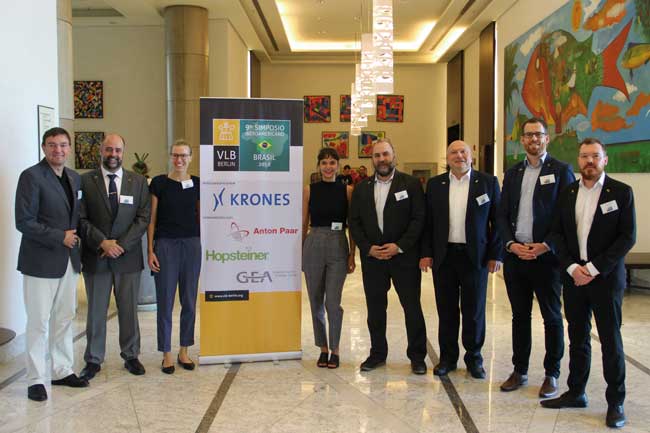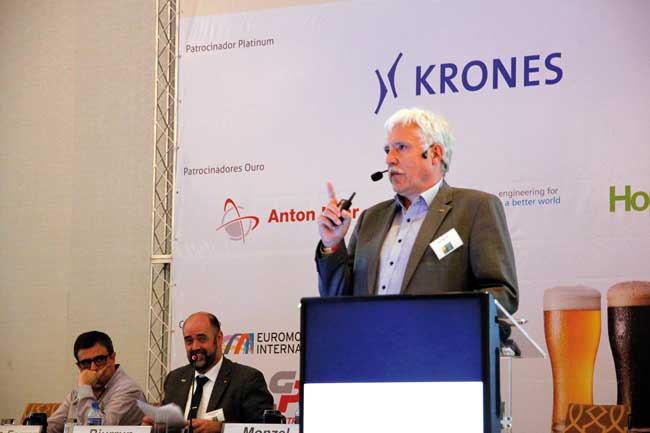The ninth Iberoamerican Symposium in Brazil
A sustainable success | VLB Berlin welcomed around 200 participants to the ninth Iberoamerican Symposium which took place from September 24th to 26th 2018. Held in the conference room of the Sheraton Reserva do Paiva near Recife, Brazil, current topics in brewing technology filled the two days of lectures.
The Brazilian market is the third largest in the world for alcoholic beverages – a total of 13.7 trillion litres were sold in Brazil in 2017. This corresponds to approximately 5 % of total global sales by volume. However, Angelica Salado presented figures from Euromonitor indicating that Brazilians are only 26th in the world in terms of per capita consumption of alcoholic beverages. The market is now recovering after the crisis years of 2014-2016. The strongest growth in individual alcoholic beverage categories was seen in cider and ready to drink (RTD) products. Beer, on the other hand, lost volume during the period from 2012 to 2017. But Salado predicts that the RTDs and High Strength Premixes (HSPs), which previously enjoyed such strong popularity, are now set to lose momentum. It is difficult to achieve and maintain a strong position in these categories, because customers are constantly looking for new innovations. The trend continues to follow the motto: “Drink less but drink better”. Accordingly, demand for premium beers is increasing. Craft beer and high-priced beers are reliable sales drivers even in times of crisis. For large companies, mergers and acquisitions are still the tool of choice to deliver continued growth. In addition, the steady expansion of a company’s portfolio is another major trend in the effort to offer customers something new on a regular basis.
Characteristically, the other lectures at the Iberoamerican Symposium contributed greatly to the knowledge base necessary for producing high-quality, trendy beverages. Henrike Vorwerk of VLB Berlin began with a report on the current state of research on gushing. In her second lecture, she also posed the question as to whether amylolytic enzymes and fermentable sugars are relevant parameters for assessing malt quality.
Equipment manufacturers are constantly seeking new ways to process raw materials as efficiently as possible. Konstantin Ziller of Ziemann Holvrieka, Ludwigsburg, Germany, provided a status report on the “Omnium” brewhouse concept, while Stefan Rupp of GEA, Kitzingen, Germany, explained his company’s role in continuous brewing processes and just-in-time production at a brewery. Hopsteiner, Mainburg, Germany, is also active in developing new equipment; namely, the company is designing a plant to recover beer from the spent hops left over after dry hop additions. Frank Peifer gave an in-depth presentation on the “Beer Cleaner”, while Marc Eckert of Bucher Unipectin, Niederweningen, Switzerland, spoke about recovering beer from surplus yeast.
Olivier Caille of Fermentis, France, discussed how different conditions present during the rehydration process influence the viability of dry yeast. For those interested in obtaining the clearest beer possible after fermentation, Lucas Lacerda of Lallemand, Canada, described the options available on the market for natural beer clarification.
Beer clarification and stabilisation
Filtration equipment from Pall Corporation, USA, is perfectly suited to accomplish conventional clarification processes. In his presentation, André Trombe introduced Pall’s latest approach to smart beer clarification. Pieter Bonte of Prozyn, São Paulo, Brazil, explained how gallotannins can serve as a post-filtration beer stabiliser. Finally, Roland Pahl of VLB Berlin discussed the use of MEBAK guidelines as a means of evaluating filtration performance on the basis of key indicators. Generally speaking, the entire brewing process is currently evaluated using key performance indicators (KPIs). Roberto Biurrun of VLB discussed which of these are relevant and which must be assessed more carefully. Key indicators and data are becoming increasingly important, especially in the digital age. Understandably, this has not escaped the attention of Dr Ing. Konrad Müller-Auffermann of Krones AG, Neutraublingen, Germany, who outlined how digitisation and technology will converge in the future. Sensors are used to collect many types of data, so Paulo Miazzo of Anton Paar Brasil took the opportunity in his lecture to elucidate the measuring principle of optical sensors utilised in the brewing process.
Sensors are also employed to guarantee product safety. Time and again, imitations appear on the market for sale as well-known branded products. Johannes Fuchs of VLB Berlin showed how such products can be exposed as counterfeits. In his second lecture, Fuchs then turned to his attention to sensory analysis and the information that it provides. Terms such as “palatable” or “a high level of drinkability” are often heard when describing the sensory impressions of a beer. The factors determining drinkability and how it is influenced was the topic of Roland Pahl’s presentation.
Filling
The lecture block for filling technology was opened by Jan Fischer of VLB, who reviewed the most important key indicators for filling lines and individual pieces of equipment. Krones AG is presently developing a filling plant which is capable of filling and closing each container in half a second. Silvio Rotta was on hand to explain the concept. In the final lecture of this block, Jan Fischer returned to the podium to clarify how risk management should properly be carried out with regard to the filling process.
Sustainability
Two presentations on sustainability were given at the close of the lecture series. Hélio de Barros Ferraz of Heineken Brasil showed how Heineken supplies sustainable energy to a brewery site using energy generated by a wind farm. And Alois Monzel from KHS, Germany, provided a general overview on supplying energy to modern breweries from the standpoint of sustainability.
Speaking of sustainability: The VLB Berlin’s Iberoamerican Symposium was once again a resounding success, so much so, that plans have already been made to host another symposium in South America in 2019.
Authors
Christoph Habel
Source
BRAUWELT International 2, 2019, page 154-155



